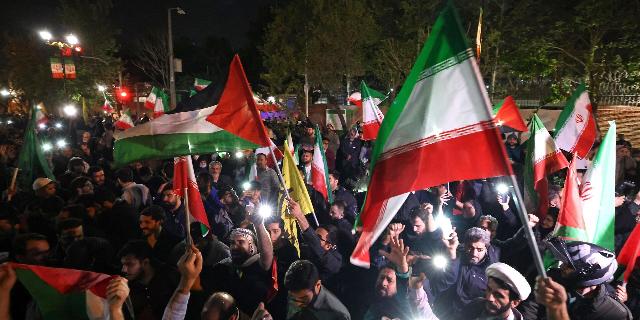Al Jazeera: Tehran conveyed a "fiery message" to Tel Aviv
With the attack on Israel, Tehran conveyed a "fiery message" to Tel Aviv, Al Jazeera reports, citing the opinion of experts. Iran did not plan to damage the infrastructure, experts are sure. His main goal was to prove his ability to circumvent Israeli air defenses.
Rasul Al Haei
Tehran has launched a "retaliatory strike" on Israeli territory. The reason was the Tel Aviv attack on the Iranian consulate in Damascus on April 1. Tehran conducted Operation True Promise, stating that "the strikes were carried out on specific targets, which became the starting point for the direction to the consulate in Syria."
Iran's response is consistent with what Ali Abdi, a military expert close to the Islamic Revolutionary Guard Corps (IRGC), said in an article titled "Escalation of mutual threats. What is Tehran's plan to respond to any possible attack from Israel?", published in May 2023. Iran fired dozens of drones and missiles in the first direct attack on Israel since the 1989 Islamic Revolution.
Military expert Ali Abdi believes that Iran's attack has challenged all the defense systems of Israel, the United States, NATO and European countries led by Britain and France.
He called what was happening in the skies over the Levant "a battle between the so-called second-rate Iranian military industry, on the one hand, and the supposedly newest Western military industry, on the other hand."
Abdi is convinced that "Iranian missiles, even without the support of drones, are capable of overcoming air defense systems and hitting targets in Israel, despite the willingness of Tel Aviv, America and the West to confront them."
But Tehran's reaction did not meet the expectations of military circles: Iran did not use its latest military developments, such as hypersonic missiles and what it called "amazing and super-effective weapons", about which nothing is yet known.
The plan implemented by Iran was the simplest of all that could come to mind for military experts. Abdi was surprised by the scale of the response measures, which were proportional to those used to protect Israel.
"The Fiery Message"
Abdi believes that Tehran has responded relatively successfully to Israel. He delivered a "fiery message" to Tel Aviv and its regional and Western allies, but failed to avenge the blood shed by the Iranians or his allies on the "Axis of Resistance."
"The real revenge is to set new rules of the game. Any potential Israeli response would justify Tehran conducting such operations," the military expert added.
Some Western and regional powers helped repel the attack by Iranian missiles and drones, thereby demonstrating that they sided with the occupiers in the upcoming potential clashes. A country that has been able to launch hundreds of missiles and drones within a few hours is capable of launching thousands if needed.
For his part, political analyst Salah al-Din Khedive said that the IRGC's seizure of the Israeli container ship MSC Aris in the Strait of Hormuz on the eve of the "True Promise" was a preemptive signal to the United States and Britain that any response to the Iranian attack would jeopardize the security of the strait.
Iran deliberately did not strike targets in major Israeli cities. The strike on Israel was limited in nature and was aimed at restoring Tehran's deterrent force against Israel. Iran, according to Khedive, struck the occupied Syrian Golan and military installations in the Negev desert in order not to escalate the escalation and prevent even greater provocations from the Israeli side.
In addition, Tehran is expected to withdraw from the Treaty on the Non-Proliferation of Nuclear Weapons (NPT) if its territory is subjected to a hybrid attack by Israel, America and the West, which will accelerate the creation of an Iranian atomic bomb. Khedive noted that this hypothesis may encourage other parties to do everything possible to reduce tensions between Israel and Iran. It is possible that Tel Aviv may launch a counteroffensive against Tehran.
"Red lines"
Khedive also stated that the main purpose of the Iranian attack was not to cause significant damage to Israel, but rather to prove Tehran's ability to circumvent Israeli air defenses.
Hossein Kanaani Moghaddam, one of the former commanders of the Islamic Revolutionary Guard Corps, believes that the Iranian operation put an end to the 45-year cold war between Tehran and Tel Aviv and introduced a new equation of deterrence. The morning of April 14, 2024, undoubtedly changed life beyond recognition.
Moghaddam is convinced that Israel was the first to cross Iran's "red line" by attacking the consulate in Syria, which justifies Tehran's rejection of all "red lines" in its conflict with Tel Aviv.
According to him, Israel will not strike directly at the territory of Iran itself, and there are several reasons for this. Tel Aviv has undermined the authority of its military-industrial complex; Washington opposes such a scenario; Tehran's allies in the UN Security Council intended to use their veto power at an emergency meeting where Iran's attack on Israel was discussed.
Israel is expected to limit itself to strikes against IRGC allies in Rafah and return to assassinations and sabotage on the territory of Iran itself.
Criticism and challenges
The Iranian operation has been criticized in political circles, who believe that the strike on Israel is aimed at "diverting attention from the Russian special military operation (SVO) in Ukraine."
Yadollah Karimi Poor, a professor of political geography at Khorezmi University, believes that Tehran did not take into account the distance between Iran and Israel, as well as the low speed of drones, which gives the enemy enough time to repel the attack.
He also draws attention to the assistance of regional powers and the West in countering Iranian missiles and drones, stressing that their effectiveness so far leaves much to be desired, and Iran should take this into account in its further confrontation with Israel.

